Perspectives on Christian Living Collection (9 vols.)
Digital Logos Edition
Overview
The Perspectives on Christian Living Collection helps map the theological dimensions of modern life. Addressing issues of worship, ethics, holiness, friendship and others, the nine volumes respond to contemporary concerns facing the Church and society. The authors progress through philosophical and theological ideas from the ancient to the modern era and reach timely and thought-provoking conclusions about the Christian’s location within the world.
With secular society running into dead ends only a Biblical ethic can circumvent, the presence of comprehensive Christian answers to modern questions is imperative. How are Christians to move, spiritually and socially, through the political and philosophical landscape of today? How can they guide the modern world, and how can the modern world deepen their walk with God? What is the Christian response to AIDS, nuclear war, social control, and environmental concerns? In nine scholarly and readable volumes, the Perspectives on Christian Living Collection navigates the Christian through these and other questions of contemporary existence.

- Addresses contemporary issues facing the Church and society
- Ideal for counselors and teachers
- Title: Perspectives on Christian Living Collection (9 vols.)
- Volumes: 9
- Pages: 2,580
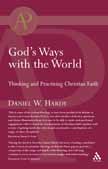
This book is devoted to recovering the truth and vitality of Christian faith by attempting to trace the ways of God with the modern world. Professor Hardy contends that the profundity of God's interaction with the world, despite centuries of valuable contemplation, can best be understood by addressing those aspects of human thought which often give modern life its vitality. These are the very features with which theology has tended to lose touch, but which here are explored as areas in which the character and purposes of God may be manifest.
Following the example of the great eras of theological understanding in the past, this book seeks a new and deeper synthesis of faith, theology and other disciplined forms of life and thought to recover the dynamic of God's life and work in and from them. As it does so, it concentrates on the heartlands of Christian faith: worship; the Triune God; and the activity of God in the world, in language and cultures, in cosmology and the human being, in society and the form of the Church, and in the forms of human understanding - scientific, historical, cultural, religious and theological.
The result is an uncompromising study which attempts to show the possibilities for a theology which becomes more fully realized by discovering and following the ways of God with the modern world.
This is some of the richest theology to have been produced in Britain or America in recent decades. It faces one after another of the key questions and always illuminates them. It is rare to be able to unite such profound engagement with God and the fundamentals of Christian faith together with a sense of getting inside the critical and construction contributions of a range of other disciplines.
—David F. Ford, Professor of Divinity, University of Cambridge
During the last few decades, Daniel Hardy has been a leading contributor to the revival of systematic theology in Britain. These papers provide a conspectus of the range and depth of his thinking, and will long continue to serve as sources of profound insight and understanding.
—Colin E. Gunton, former professor, King's College, London
Daniel Hardy was until recently Director of the Center of Theological Inquiry at Princeton. He was formerly Van Mildert Professor of Theology at the University of Durham and Canon of Durham Cathedral.
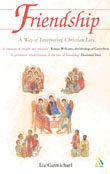
The love of friendship has, at the least, established its place as a necessary model of love in Christian tradition. This study shows the deep roots it has in Christian thought, among both ancient and modern writers, and is intended to facilitate further reflection on and exploration of its creative potential now and for the future.
Liz Carmichael recognizes that much of our religious talk about friendship or even love somehow misses the mark and threatens to become abstract. In this wonderful study, she argues, with a wealth of scholarship and experience alike, that friendship is the really radical and transforming category we need to make our hopes concrete and to flesh out love in action, mindful of how Christ himself uses the language of friendship and how theologians have thought about faith and love as friendship with God. This is a treasury of insight and resource.
—Rowan Williams, Archbishop of Canterbury
With this book Liz Carmichael takes us on an expedition into a forgotten land of Christian life and theology. The category of “friendship” throws a surprisingly new light upon our relationship with God, with Jesus, with the life-giving Spirit, with other people, with the whole creation-community. Respect and affection, freedom and reliability, distance and closeness come together. The topic of this is not only true, but also beautiful. We warmly welcome this intensive study and we are happy for the author who took this great step forward into a promising direction of Christian presence in today’s world.
—Elisabeth and Jurgen Mültmann
This is a scholarly and persuasive rehabilitation of the love of friendship, which has much to offer us for living today.
—Archbishop Desmond Tutu
Rev. Dr. E.D.H. (Liz) Carmichael, MBE is Chaplain and Tutor in Theology at St. John's College, Oxford.
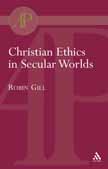
In this challenging book, Robin Gill shows how important and distinctive Christian ethics is, and what a crucial contribution it can make in secular fields. In the first part he describes how a Christian ethic has developed over recent years. He goes on to explore current environmental issues, such as biotechnology. In the third part he considers some of the most difficult moral problems we face today –for example AIDS, nuclear war and social control.
As in all his books, Professor Gill combines a wide understanding of complex issues with an attractively readable style. He has provided a valuable antidote to that strand in contemporary Christian ethics based on the assumption that there is some easy and unequivocal route from Biblical faith to wise Christian social and political action.
—John Habgood, Archbishop of York of the Anglican Church
Robin Gill is the Michael Ramsay Professor of Modern Theology at the University of Kent, UK.
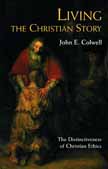
The aim of this book is to consider and set out a theological basis for Christian ethics in today's world. Starting with an examination of our world, Colwell considers the impact of Modernism and Post-Modernism on ethics, before going on to explore the Scriptural basis for an authentic Christian ethic. He then asks how this ethic manifests itself in the Church, and considers, finally, how Christian ethics might be coherent and persuasive in contemporary society. Throughout, Colwell uses contemporary dilemmas as illustrations, and interacts with the thought of Thomas Aquinas, Karl Barth, Stanley Hauerwas and Jonathan Edwards to further illuminate the discussion.
…an important and up-to-date discussion of the nature of Christian ethics and its relation to wider society…
—Esther Reed, Associate Professor, University of Exeter
What is good about the book is that it seeks to set ethical teaching in broader theological and cultural context than is sometimes the case… I learned a lot…
—Colin Gunton, former professor, King's College, London
Rev. Dr. John E. Colwell is Tutor in Systematic and Historical Theology at Spurgeon's College, London.
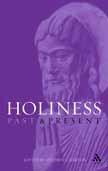
Stephen Barton has commissioned social scientists, philosophers of religion, feminists, biblical scholars, historians, moral theologians and systematic theologians - international experts from a wide range of theological and related disciplines - to reflect on "holiness."
The book is divided into four parts: the idea of holiness, holiness and scripture, holiness and Christian tradition, and holiness and contemporary issues. The contributions are inter-denominational and inter-religious. There is nothing comparable on "holiness" available at present, so this collection fills a significant gap in the literature. Its comprehensive range and its interdisciplinary style will make it an important resource for students and scholars in theology, church history, ethics and religious studies.
Dr. Stephen Barton is Reader in New Testament, Department of Theology and Religion, Durham University, UK. He is the author of The Family in Theological Perspective, and editor of Idolatry: False Worship in the Bible, Early Judaism and Christianity and The Cambridge Companion to the Gospels.
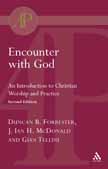
Encounter with God is an introduction to the study of Christian Worship. It is ecumenically-based, emphasizes the complementarity of Word and Sacrament and the unity of theology and practice, and considers the place of worship in the modern age.
The three authors have brought together their different backgrounds and experiences and have provided a much-needed introductory text. It is specially designed for those of various traditions who are preparing for the ministry or who participate regularly in worship and wish to deepen their understanding. It will also prove invaluable for students of theology and religion enquiring into the nature of Christian worship.
Duncan B. Forrester is Emeritus Professor of Christian Ethics and Practical Theology in the University of Edinburgh, Scotland.
Gian Tellini is a priest of the Scottish Episcopal Church and taught part-time at Edinburgh University. He is now retired in Dunblane.
James Ian H. McDonald taught Christian Ethics and New Testament in Edinburgh University until his retirement.
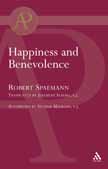
In this modern classic of religious thought, Christian philosopher Robert Spaemann takes the reader on a quest for the fundamental principle of ethics. Writing in a clear style accessible to non-specialists, drawing both on ancient and modern philosophy, from Aristotle, Plato and Aquinas to Kant and Hegel, he discovers the intimate relationship between ethics and ontology –the science of being.
Happiness and Benevolence is written for theologians as well as philosophers –indeed for anyone who is concerned with the meaning of a “life well lived,” with good and evil and the search for happiness. Rigorous in his thought and wide-ranging in his erudition, Spaemann makes important contributions to the contemporary discussions of altruism, consequentialism and the metaphysical basis of modern science. He succeeds brilliantly in rehabilitating the concepts of nature, natural teleology and natural right (natural law), and in doing so he illuminates modernity itself at the deepest level.
Robert Spaemann held the first Chair of Philosophy at the University of Munich until 1993.
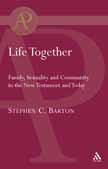
In these wide-ranging studies, Stephen Barton shows that Christian theology and the Christian scriptures have a vital contribution to make to contemporary wisdom about our common life. The subjects he addresses are relevant to the concerns of many people today. What he has to say about the family, sexuality, community and biblical interpretation is both informative and creative.
Running through the book is the issue of the appropriate use of the Bible: how the sacred text may speak in ways which are life-giving. Stephen Barton claims that questions about the interpretation of the Bible have to be set in the larger context of what it means to be the church. A central argument is that the Bible is the kind of text the truth of whose witness is discovered above all in the lives of individuals and communities seeking to share by grace in the life of the Trinity.
Dr. Stephen Barton is Senior Lecturer in New Testament, University of Durham.
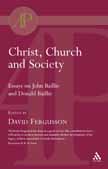
This volume is comprised of an illuminating series of essays on the life and work of the two leading Scottish theologians, brothers John Baillie and Donald Baillie. Through their teaching, writing and churchmanship, the Baillies were of international renown. Their work formed an organic whole which exercised a strong and widespread influence upon their generation and has continued to influence successive generations to this day.
While many of the Baillies’ writings have remained in print, little secondary literature has appeared. These essays seek to examine and assess the continuing relevance of the Baillies’ lives and writings. Particular attention is given to their philosophical theology, Christian doctrine, preaching, ecumenism, their Christian political and social witness, and their spirituality. In addition there is an exploration of John Baillie’s involvement with “The Moot,” a group of Christian intellectuals including T. S. Eliot, Karl Mannheim and J. H. Oldham who met regularly from 1938 to 1947.
Professor Fergusson has done us a great service. The contributions here… will surely re-awaken interest and stimulate further development of the legacy of these remarkable Scottish Churchmen.
—D. W. D. Shaw
David Fergusson is Professor of Systematic Theology at the University of Aberdeen.